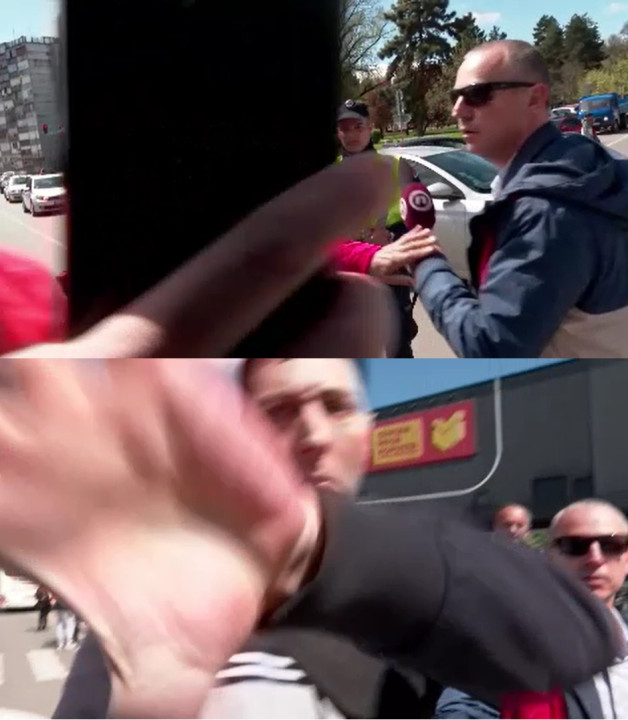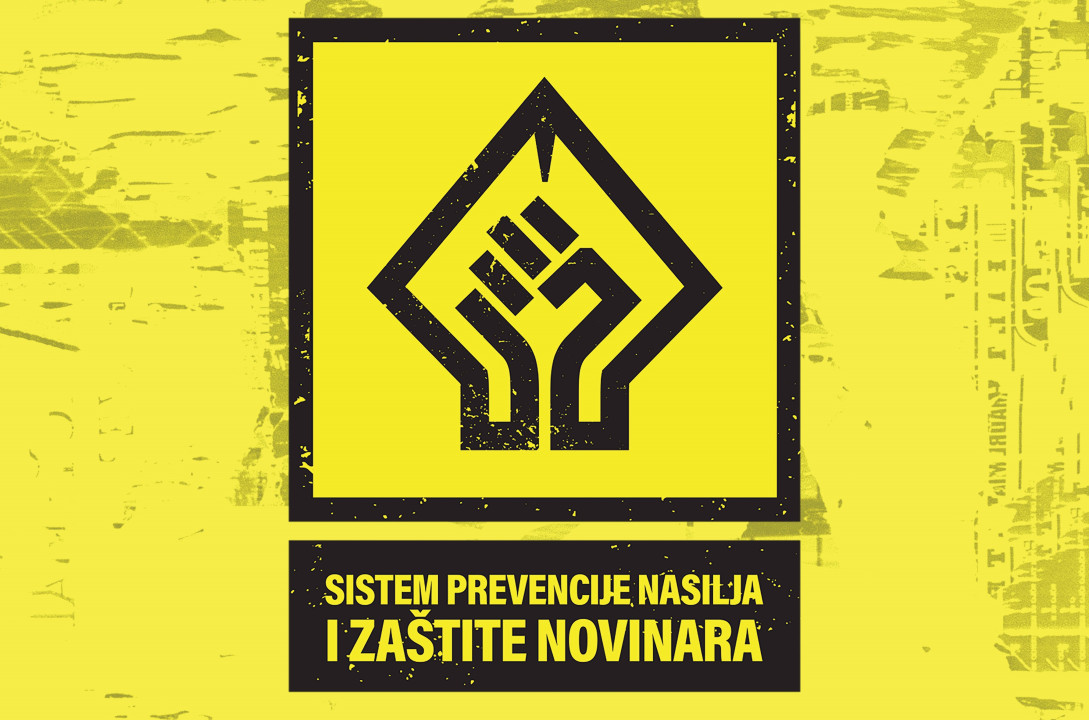English version below
Jučerašnji „rat protiv medija i novinara“ započela je predsednica skupštine Srbije Ana Brnabić, optužujući na konferenciji za novinare, agenciju Fonet tvrdnjom da su pozvali na ubistvo predsednika Srbije prenošenjem izjave advokata Bože Prelevića. Iako Fonet nije objavio ono što mu je pripisano, sa jedne od najmoćnijih pozicija u Srbiji je plasirana lažna vest. U atmosferi svakodnevnih napada na novinare, to predstavlja otvoreno crtanje mete ne samo zaposlenima u ovoj agenciji, već i svim drugim novinarima koje predstavnici vlasti svakodnevno prozivaju što je već postao obrazac za njihovu satanizaciju i dehumanizaciju. Svakodnevno se na novinare i medije „odapinju strele“.
Prvi fizički napad na novinara i na opremu za rad dogodio se u Novom Sadu kada je prilikom obavljanja svog posla napadnut Zoran Strika, zamenik glavnog urednika Radija 021 koji je izveštavao sa polaska građana na miting SNS u Beograd. Tom prilikom dvojica mladića oborili su jednog Novosađanina, koji je svojim mobilnim telefonom snimao događaj. Dok je bio na zemlji, udarali su ga, oteli mu telefonski uređaj i bacili u Dunav. Videvši da je novinar Strika snimio ceo događaj, drugi mladić ga je fizički napao, nastojeći da mu otme telefon držeći ga za ruku i vrat, ne prestajući da ga napada čak ni kada je Strika naglasio da je novinar. Iako je urednik Radija 021, zatražio od prisutnog direktora Pokrajinskog fonda za evropske poslove i razvoj da spreči ovaj napad, nije bilo reakcije, ali je Strika uspeo da se oslobodi i pozove policiju i zajedno sa napadnutim Novosađaninom skloni sa mesta napada. Dok su čekali policiju, napali su ih trojica mladića sa kapuljačama. Imali su nameru da otmu telefon koji je novinar pozajmio sugrađaninu kako bi se javio supruzi. I ovaj oteti telefon su bacili u Dunav sa očiglednom namerom da se unište dokazi o nasilju koje je ta grupa činila.
Ovakvi napadi na telo novinara i njegovu imovinu uz uništavanje dokaza, jasno govore o politici koja ima nameru da ukine slobodu govora i da maksimalno oteža rad novinarima u okviru profesije koja putem objektivnog informisanja treba da štiti i promoviše javni interes. U toj nameri vlast očito ne preza od toga da za tu svrhu koristi i falange u crnim uniformama sa kapuljačama i maskama.
Na velikom mitingu „Ne damo Srbiju“ koji je u Beogradu organizovala SNS, napadnuta je televizijska ekipa KTV, u trenutku dok je prenosila zbivanja sa lica mesta kao i razgovore Nemanje Šarovića sa okupljenim građanima. Posle niza uvreda i pretnji, od strane osoba koje su bile obučene kao redari a među kojima se mogu prepoznati vodeći ljudi javnih preduzeća i državnih ustanova, usledilo je gađanje plastičnim flašicama, polivanje vodom, nadgurivanje, potiskivanje i udaranje članova novinarske ekipe u kojoj je bio i Danijel Radić, direktor KTV iz Zrenjanina. Dok je policija ovo nemo posmatrala, usledio je i fizički napad na kamermana Sinišu Nikšića koji je udaren u predelu nosa i kome je oštećena kamera, kao i druga oprema. Prisutna policija je reagovala tek nakon fizičkog napada i to tako što je opkolila novinarsku ekipu i zabranila im nastavak izveštavanja uz ograničenje kretanje zbog nemogućnosti da im garantuju bezbednost. Umesto sankcionisanja nasilnika, sprečen je novinarski rad uz reči policajca da su dovoljno izveštavali. Ekipa je onemogućena da se kreće sve dok se miting nije završio i učesnici razišli. Ovime su direktno ugrožavanje bezbednosti, napad na telo i imovinu, nadograđeni sprečavanjem obavljanja posla i nezakonitim zadržavanjem novinarske ekipe KTV.
Treći slučaj napada dogodio se u Čačku, dok je novinar TV Nova S Nebojša Jovanović pripremao prilog o polasku građana Čačka na miting SNS u Beograd. Predsednik Skupštine opštine Čačak Igor Trifunović, pokušao je da spreči snimanje ovog javnog događaja, agresivnim ponašanjem, što je motivisalo jednog od nasilnika da spreči snimanje pokušajem oštećenja kamere, odgurivanja kamermana, otimanjem i bacanjem mikrofona na pod. I u ovom slučaju policija se tek naknadno umešala.

Tokom obavljanja novinarskog posla u Nišu, ugrožavana je bezbednost novinara Srđana Nonića sa portala Niška inicijativa koji je pokušavao da obavlja svoj novinarski posao izveštavajući sa priprema za polazak učesnika beogradskog mitinga. Nonić je dobio više verbalnih pretnji i gađan je flašom od strane „maskirane grupe koja je bila neformalno obezbeđenje“. U Nišu se ponovio se obrazac napada u Novom Sadu jer je jedan građanin fotografisao neformalno obezbeđenje koje se potom ustremilo na istog i njegovo vozilo. Eskalacija sukoba je sprečena tek pošto je interevenisala policija.
Televizijskoj ekipi Al Džazeire, onemogućeno je da snima miting sa balkona zgrade u okolini Skupštine Srbije što je još jedan primer sprečavanja medija da rade svoj posao.
Ovaj pregled napada i pretnji upućenih novinarima i medijskim radnicima u nekoliko gradova je veoma zabrinjavajući jer dolaze od najviših organa vlasti, direktora javnih preduzeća i čelnika republičkih institucija i uličnih nasilnika koji uživaju zaštitu policije i drugih organa vlasti koji bi trebali da štite a ne da raspiruju atmosferu mržnje i nasilja prema medijima. Ako se nastavi, ovaj negativan trend mogao bi da ima nesagledive posledice i zato se svi vinovnici moraju procesuirati. U protivnom će nekažnjivost napada na novinare dovesti do neželjene eskalacije u vremenu tenzija i raspolućenosti društva.
Asocijacija nezavisnih elektronskih medija
ANEM: The government on the offensive against the journalists and the media
In just one day, a series of dangerous attacks on journalists and the media took place, which will increasingly characterize the life of journalists in Serbia. In the daily repression in which we live and work, these are no longer isolated incidents but a rule that justifiably causes great concern.
Yesterday's "war against the media and journalists" was started by the Speaker of the Assembly of Serbia, Ana Brnabic, accusing the Fonet agency at a press conference of claiming that they had called for the assassination of the President of Serbia by broadcasting the statement of lawyer Boza Prelevic. Although Fonet did not publish what was attributed to it, fake news was spread from one of the most powerful positions in Serbia. In the atmosphere of daily attacks on journalists, this represents an open target not only for the employees of this agency, but also for all other journalists who are called out daily by the authorities, which has already become a pattern for their demonization and dehumanization. "Arrows are being fired" at journalists and the media on a daily basis.
The first physical attack on a journalist and on work equipment took place in Novi Sad when Zoran Strika, the deputy editor-in-chief of Radio 021, was attacked during the performance of his work while reporting on the citizens' departure for the SNS rally in Belgrade. On that occasion, two young men knocked down a man from Novi Sad, who was filming the incident with his mobile phone. While he was on the ground, they beat him, stole his phone and threw it into the Danube. Seeing that the journalist Strika recorded the whole event, another young man physically attacked him, trying to snatch his phone by holding him by the arm and neck, without stopping attacking him even when Strika emphasized that he was a journalist. Despite the fact that the editor of Radio 021, asked the present director of the Provincial Fund for European Affairs and Development to prevent this attack, there was no reaction, but Strika managed to free himself and call the police and, together with the attacked citizen of Novi Sad, moved away from the scene of the attack. While they were waiting for the police, they were attacked by three hooded youths. They intended to steal the phone that the journalist had borrowed to his fellow citizen in order to call his wife. They also threw this stolen phone into the Danube with the obvious intention of destroying the evidence of the violence committed by that group.
Such attacks on the journalist's body and his property, along with the destruction of evidence, clearly speak of a policy that intends to abolish freedom of speech and make the work of journalists as difficult as possible within the profession that should protect and promote the public interest through objective information. In this intention, the government obviously does not hesitate to use phalanxes in black uniforms with hoods and masks for this purpose.
At the large rally "We will not give Serbia", organized by SNS in Belgrade, the television crew of KTV was attacked, while it was broadcasting events from the scene as well as Nemanja Sarovic's interviews with the gathered citizens. After a series of insults and threats, by persons who were dressed as security guards and among whom one can recognize the leaders of public companies and state institutions, there was throwing of plastic bottles, pouring of water, pushing and hitting of the members of the journalistic team, which included Danijel Radic, director of KTV from Zrenjanin. While the police watched this silently, there was a physical attack on cameraman Sinisa Niksic, who was hit in the nose area and whose camera and other equipment were damaged. The present police officers reacted only after the physical attack, by surrounding the journalist team and forbidding them to continue reporting, while restricting their movement due to the impossibility of guaranteeing their safety. Instead of sanctioning the perpetrators, journalistic work was prevented, with the police saying to them that they had done sufficient reporting. The team was prevented from moving until the rally was over and the participants dispersed. This is a direct threat to security, an attack on the body and property, upgraded by the prevention of work and the illegal detention of the KTV journalistic team.
The third case of attack happened in Cacak, while TV Nova S journalist Nebojsa Jovanovic prepared a report on the departure of citizens of Cacak to the SNS rally in Belgrade. The President of the Cacak Municipality Assembly, lgor Trifunovic, tried to prevent the recording of this public event by aggressive behavior, which motivated one of the thugs to prevent the recording by trying to damage the camera, push the cameraman away, snatch and throw the microphone on the floor. In this case, the police intervened only later.
While performing his journalistic work in Nis, the safety of journalist Srdjan Nonic from the Niska initiative portal, who was trying to perform his journalistic work reporting on the preparations for the departure of the participants of the Belgrade rally, was threatened. Nonic received several verbal threats and was mugged by a "masked group that was informal security". In Nis, the pattern of attacks in Novi Sad was repeated because a citizen took a photo of the members of informal security, which then targeted him and his vehicle. Escalation of the conflict was prevented only after the police intervened.
The television crew of Al Jazeera was prevented from filming the rally from the balcony of the building in the vicinity of the Serbian Parliament, which is another example of preventing the media from doing their job.
This overview of attacks and threats directed at journalists and the media workers in several cities is very worrying because they come from the highest authorities, directors of public companies and heads of state institutions and street thugs who enjoy the protection of the police and other authorities who should protect and not fuel the atmosphere of hatred and violence towards the media. If it continues, this negative trend could have unforeseeable consequences and therefore all the culprits must be prosecuted. Otherwise, impunity for attacks on journalists will lead to an unwanted escalation in a time of tension and division in society.
Association of Independent Electronic Media


